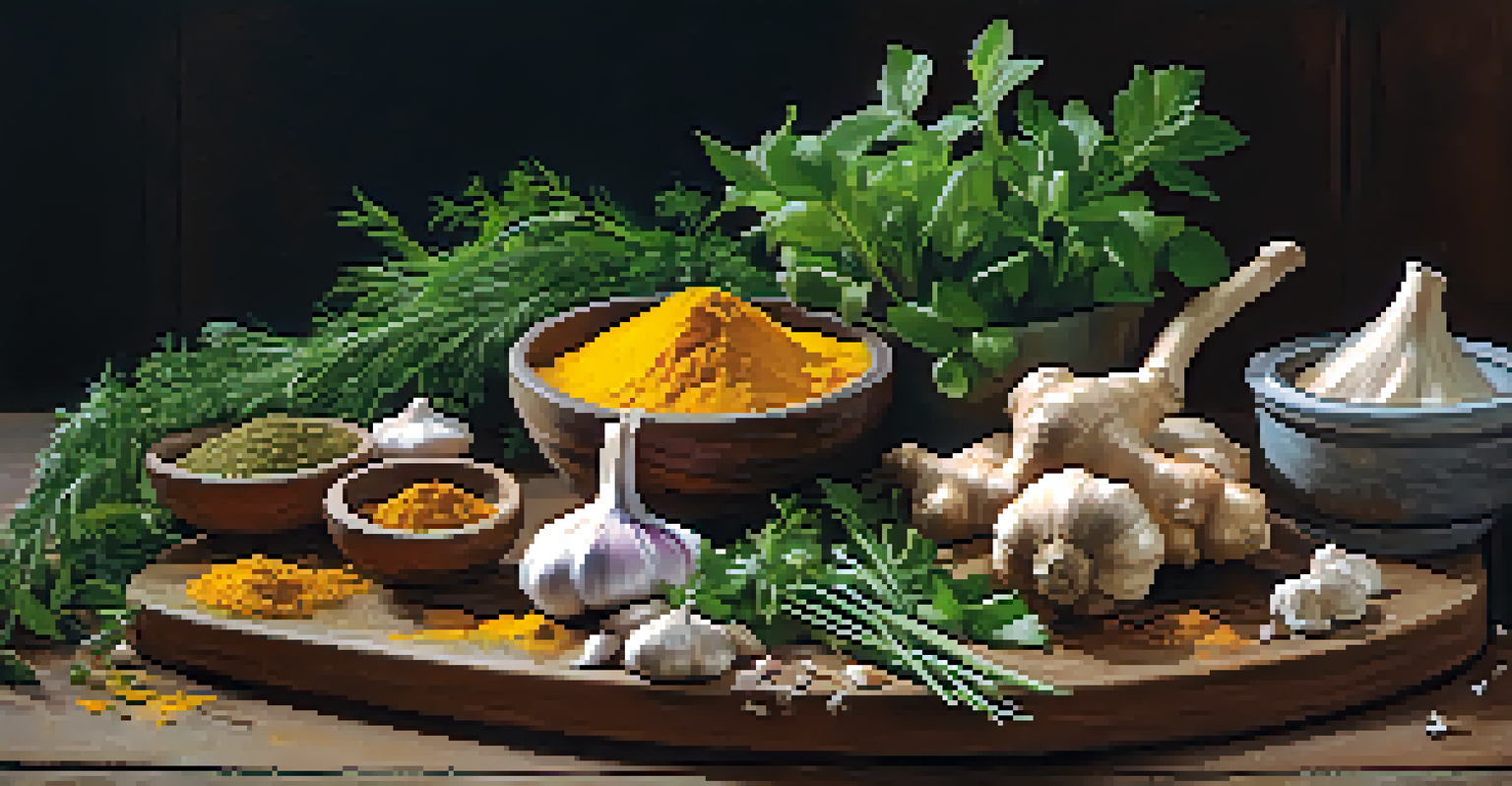Herbal Remedies: Supporting Gut Microbiome in Naturopathy

Understanding the Gut Microbiome's Role in Health
The gut microbiome is a complex community of microorganisms living in your digestive tract. These tiny organisms play a crucial role in digestion, immunity, and even mental health. Think of your gut microbiome as a bustling city, where each microbe performs its unique function to keep the system running smoothly.
Let food be thy medicine and medicine be thy food.
A balanced microbiome can help prevent various health issues, including digestive disorders, obesity, and autoimmune diseases. When the balance is disrupted, often due to poor diet or antibiotic use, it can lead to a range of problems. Just like a city struggling with traffic congestion, an unbalanced microbiome can create chaos in your body.
This is where naturopathy comes in, offering holistic approaches to restore and support gut health. One of the most effective methods is through herbal remedies, which can help nourish the microbiome and promote a healthier digestive environment.
The Power of Herbal Remedies in Naturopathy
Herbal remedies have been used for centuries to promote health and well-being. In naturopathy, these natural solutions are favored for their ability to support the body’s healing processes without harsh chemicals. It's like choosing to walk instead of drive; herbal remedies often provide a gentler, more sustainable approach to health.

Specific herbs, such as ginger, peppermint, and chamomile, can soothe the digestive system and enhance gut function. These herbs not only taste great but also possess properties that help manage inflammation and support healthy digestion. Imagine sipping a warm cup of chamomile tea after a heavy meal; it’s a simple yet effective way to ease discomfort.
Gut Microbiome Affects Overall Health
The gut microbiome plays a vital role in digestion, immunity, and mental health, highlighting the importance of maintaining its balance.
Incorporating these herbal remedies into your diet can lead to a happier gut. By promoting a balanced microbiome, you support overall health, making herbal remedies a cornerstone of naturopathic practices.
Key Herbs for Supporting Gut Microbiome Health
Several herbs stand out when it comes to supporting gut microbiome health. For instance, garlic is known for its prebiotic properties, which feed beneficial gut bacteria. Think of garlic as the fertilizer in your garden, helping good plants flourish while keeping the weeds at bay.
All disease begins in the gut.
Another powerful herb is turmeric, which is famous for its anti-inflammatory benefits. It helps reduce gut inflammation, allowing the microbiome to thrive. Adding turmeric to your meals not only boosts flavor but also contributes to a healthier digestive system.
Lastly, fennel seeds can aid in digestion and reduce bloating. They work like a soothing balm for your digestive tract, making them an excellent addition to herbal teas or dishes. By including these herbs in your diet, you can actively support your gut health.
Probiotics and Herbal Synergy in Naturopathy
Combining herbal remedies with probiotics is a powerful strategy in supporting gut health. Probiotics are live beneficial bacteria that can help restore the natural balance of your gut microbiome. Picture them as friendly neighbors moving into your busy city, helping to ease congestion and enhance community harmony.
Herbs can complement probiotics by providing the nutrients these bacteria need to thrive. For example, taking a probiotic supplement alongside a herbal prebiotic like chicory root can enhance the effectiveness of both. This synergy creates a more robust environment for your gut flora and improves overall digestive health.
Herbal Remedies Support Gut Health
Incorporating herbal remedies like ginger, garlic, and turmeric can enhance gut function and promote a balanced microbiome.
Incorporating both herbs and probiotics into your routine is like planting different types of flowers in your garden. Each contributes uniquely to the ecosystem, resulting in a more vibrant and resilient microbiome.
Lifestyle Factors Influencing Gut Microbiome Health
While herbs play a crucial role in supporting gut health, lifestyle factors are equally important. Diet, stress management, and regular physical activity all impact the microbiome's balance. Imagine your gut as a delicate ecosystem that thrives on variety and stability; neglecting these factors can throw it off balance.
Eating a diverse range of foods, particularly fiber-rich fruits and vegetables, is key to fostering a healthy gut. A varied diet provides different nutrients that support various microbial species, much like a diverse diet supports a vibrant community. Moreover, managing stress through practices like meditation or yoga can significantly improve gut health.
By considering these lifestyle factors alongside herbal remedies, you can create a holistic approach to gut health that nurtures your microbiome and enhances overall well-being.
How to Incorporate Herbal Remedies Into Your Routine
Incorporating herbal remedies into your daily routine can be simple and enjoyable. Start by adding herbal teas to your morning or evening rituals; options like peppermint or ginger can be particularly soothing for your digestive system. Think of tea time as a moment to pause and nurture your gut health.
You can also experiment with cooking by adding herbs and spices to your meals. Using fresh herbs like basil or thyme not only enhances flavor but also boosts the nutritional value of your dishes. It’s like adding vibrant colors to your plate, making meals both healthier and more appealing.
Lifestyle Impacts Microbiome Balance
Diet, stress management, and physical activity are essential lifestyle factors that significantly influence the health of your gut microbiome.
Lastly, consider herbal supplements if you're looking for a concentrated source of beneficial compounds. Just be sure to consult with a healthcare professional to find the right options for your specific needs, ensuring a safe and effective approach to gut health.
Consulting with a Naturopath for Personalized Care
While self-education is valuable, consulting with a naturopath can provide personalized guidance for your gut health journey. Naturopaths can assess your specific needs and recommend tailored herbal remedies and lifestyle changes. Think of them as a personal trainer for your gut, helping you navigate the best path forward.
A naturopath will often take a holistic view, considering not just your symptoms but also your overall lifestyle and health history. This comprehensive approach can uncover underlying issues that may be affecting your gut health. It’s like checking the foundation of a house before renovating—the stronger the base, the better the outcome.

By working closely with a naturopath, you can create a customized plan that aligns with your health goals, making your journey to a healthier gut more effective and sustainable.